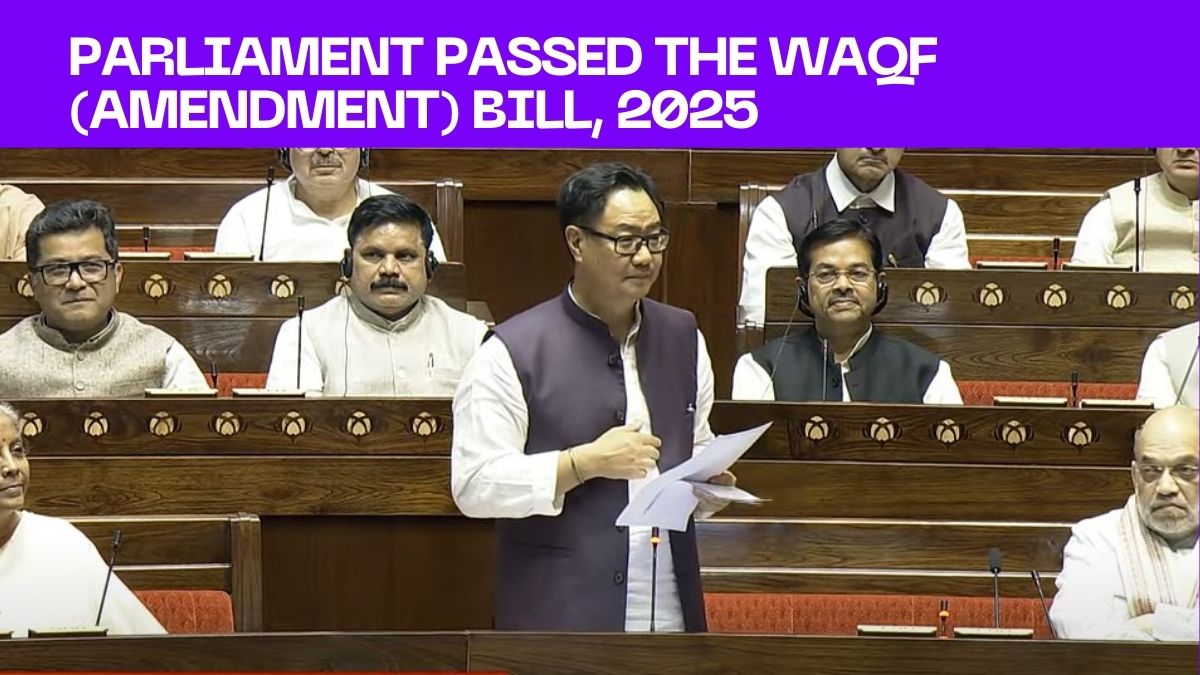The Indian Parliament recently passed significant legislative measures aimed at reforming the management of Waqf properties and strengthening their oversight. The Waqf (Amendment) Bill, 2025, and the Mussalman Wakf (Repeal) Bill, 2024, were debated and approved in both houses of Parliament. It was passed by the Rajya Sabha in the early hours of Friday after a marathon 12-hour debate. With 128 votes in favor and 95 against, the bill received approval from the upper house, following the Lok Sabha’s clearance on Thursday with a 288-232 vote. In addition, the Rajya Sabha also passed the Mussalman Wakf (Repeal) Bill, 2024, after a 17-hour sitting that was adjourned at 4 a.m.
Key Points
Purpose of the Bill
- The Waqf (Amendment) Bill, 2025, aims to streamline the functioning of Waqf properties and improve transparency and accountability.
- It seeks to strengthen the administrative mechanisms overseeing Waqf properties and enhance their legal framework.
Passed in Lok Sabha/Rajya Sabha
- Waqf (Amendment) Bill 2025 renamed as Unified Waqf Management, Empowerment, Efficiency, and Development (UMEED) Bill.
- Mussalman Wakf (Repeal) Bill 2024 approved, repealing the Mussalman Wakf Act, 1923.
Parliamentary Process
- The Bill passed with a 128-95 vote in the Rajya Sabha after a 12-hour debate, following the Lok Sabha’s approval with a 288-232 vote.
- The debate saw active participation from lawmakers, with discussions centered around the management and use of Waqf assets and the role of tribunals in resolving conflicts.
Ministerial Statements
- Amit Shah, the Union Home Minister, and Kiren Rijiju, the Union Minister for Minority Affairs, played a significant role in defending the Bill and its provisions during the parliamentary debates.
Waqf (Amendment) Bill 2025 & Mussalman Wakf (Repeal) Bill 2024
Background
Two Bills Introduced,
- Waqf (Amendment) Bill
- Mussalman Wakf (Repeal) Bill
Objectives
Waqf (Amendment) Bill, 2025
- Amend the Waqf Act, 1995 to address challenges in managing Waqf properties.
- Improve administration and efficiency of Waqf boards.
Mussalman Wakf (Repeal) Bill, 2024
- Repeal the Mussalman Wakf Act, 1923, an outdated colonial-era law.
- Ensure uniformity, transparency, and accountability in Waqf property management under the Waqf Act, 1995.
- Eliminate inconsistencies and ambiguities created by the old law.
Meaning of ‘Waqf’
- Properties dedicated for religious or charitable purposes under Islamic law.
- Sale or other use of the property is prohibited.
- Ownership is transferred to Allah, making it irrevocable.
- Managed by a mutawalli on behalf of the wakif (creator).
Origin of the Concept of ‘Waqf’
- Traces back to the Delhi Sultanate when Sultan Muizuddin Sam Ghaor dedicated villages to the Jama Masjid of Multan.
- Waqf properties grew with the rise of Islamic dynasties in India.
- Mussalman Waqf Validating Act of 1913 protected Waqf in India.
Constitutional Framework and Governance
- Charitable and religious institutions fall under the Concurrent List of the Constitution.
- Both Parliament and State Legislatures can frame laws on it.
- Waqf Governance: Governed by the Waqf Act, 1995, replacing earlier laws from 1913, 1923, and 1954.
Creation of Waqf
Created via,
- Declaration (oral or written deed).
- Long-term use of land for religious or charitable purposes.
- Endowment after the end of a line of succession.
States with highest Waqf properties
- Uttar Pradesh (27%)
- West Bengal (9%)
- Punjab (9%)
Evolution of Waqf Laws
- 1913 Act: Validated Waqf deeds.
- 1923 Act: Made registration of Waqf properties mandatory.
- 1954 Act: Established Central Waqf Council and State Waqf Boards.
- 1995 Act: Introduced Tribunals for dispute resolution, with elected members and Islamic scholars.
Key Amendments in the New Bill
Central Waqf Council Composition
- Union Minister in charge of waqf is the ex-officio chairperson.
Members include
- Members of Parliament (MPs).
- Persons of national eminence.
- Retired Supreme Court/High Court judges.
- Eminent scholars in Muslim law.
- New Provision: Non-Muslim members required (two).
Composition of Waqf Boards
- Empower state governments to nominate one person from each group.
- Non-Muslim members required (two).
- Includes one member each from Shias, Sunnis, and Backward Muslim classes.
- Two Muslim women members required.
Composition of Tribunals
- Removes expert in Muslim law.
- District Court judge as chairman.
- Joint Secretary rank officer.
Appeals Against Tribunal Orders
- Previous Act: No appeals allowed.
- New Bill: Allows appeals against Tribunal decisions to the High Court within 90 days.
Survey of Properties
- Replaces Survey Commissioner with District Collector or senior officers to oversee the survey of Waqf properties.
Government Property as Waqf
- Government property identified as Waqf will cease to be Waqf.
- Revenue records updated by the Collector.
Audits
- Waqf institutions earning over ₹1 lakh will undergo audits by state-sponsored auditors.
Centralized Portal
- Automated Waqf property management via a centralized portal for enhanced efficiency and transparency.
Property Dedication
- Practicing Muslims (at least five years) can dedicate property to Waqf, restoring pre-2013 rules.
Women’s Inheritance
- Women must receive inheritance before Waqf declaration.
- Special provisions for widows, divorced women, and orphans.
Need for the Bill
- Unified Digital Listing of Waqf properties to reduce litigation and ensure transparency.
- Ensures gender justice by mandating women’s inclusion in Waqf Boards.
Concerns
Non-Muslim Members in Waqf Boards
- Mandates inclusion of non-Muslim members in State Waqf Boards and Central Waqf Council.
- Concern that these bodies could be majorly composed of non-Muslims, unlike similar boards for Hindu and Sikh endowments.
Impact on Waqf Tribunals
- Removal of experts in Muslim law from Waqf Tribunals may affect dispute resolution.
Creation of Waqf
- Limiting Waqf creation to Muslims practicing Islam for at least five years.
- Ambiguity about the rationale behind this five-year criterion.
Conclusion
- The Bill represents a significant step towards reforming Waqf property management in India.
- Proposed reforms ensure better governance, accountability, and a more inclusive approach, benefiting all involved communities.



 Railways Goes Smart! AI-Enabled Apps to ...
Railways Goes Smart! AI-Enabled Apps to ...
 8-Year-Old Ranvir Sachdeva Becomes Young...
8-Year-Old Ranvir Sachdeva Becomes Young...
 From April 1, Toll Booths Go Fully Digit...
From April 1, Toll Booths Go Fully Digit...








